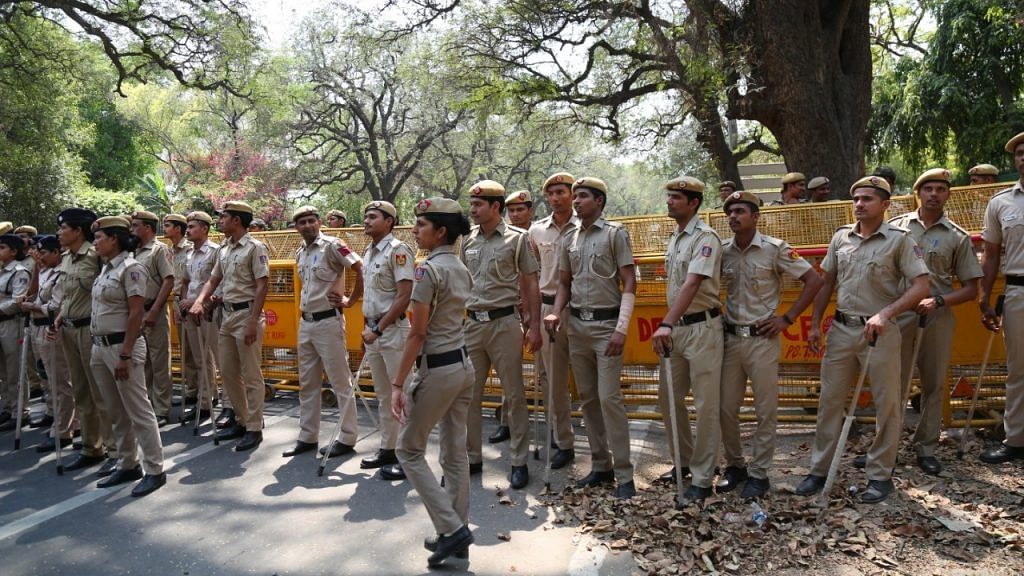New Delhi: The Lieutenant Governor of Delhi late Friday passed an order conferring the Commissioner of Police with the power to detain under the draconian National Security Act (NSA) for a period of three months — between 19 January and 18 April.
This provision is already there in the 1980 Act, but is re-notified every quarter. The latest order was issued on 10 January. Similar orders were issued in July and October last year.
Under the National Security Act, an individual can be detained without a charge for up to 12 months. The individual also need not be informed of the charges for 10 days.
The detained individual can appeal before a high court advisory board but is not allowed a lawyer during the trial.
Also, the individual can be put under preventive detention for months if authorities are satisfied that he/she is a threat to national security or law and order. The state government concerned needs to be intimated that an individual has been detained under the NSA.
The order by the Delhi L-G comes at a time when the capital is seeing protests against the new citizenship law and the National Register of Citizens.
Delhi Police, however, said it was a “routine order” and is issued “every quarter”.
“There is nothing new in this. Such an order is issued once in every three months that gives power to the police chief to detain under the NSA,” a senior police officer said.
Another police officer told ThePrint, “Under the Act, the police chief or the district magistrate has this power. This has always been there, though it is rarely exercised.”
A similar order was issued in Andhra Pradesh on 14 January.
Also read: Iltija Mufti ‘detained’ for trying to visit grandfather’s grave, heckled in front of media
History of the law and the grounds of detention under NSA
The National Security Act was promulgated on 23 September 1980 by the Indira Gandhi government and its purpose is “to provide for preventive detention in certain cases and for matters connected therewith”.
It applies to the entirety of India. According to the National Security Act, the grounds for preventive detention of a person include:
A. Acting in any manner prejudicial to the defence of India, the relations of India with foreign powers, or the security of India.
B. Regulating the continued presence of any foreigner in India or with a view to making arrangements for his expulsion from India.
C. Preventing them from acting in any manner prejudicial to the security of the State or from acting in any manner prejudicial to the maintenance of public order or from acting in any manner prejudicial to the maintenance of supplies and services essential to the community it is necessary so to do.
Why NSA is criticised, and how it is different from regular detention
In the normal course, if a person is arrested, he or she is guaranteed certain basic rights. These include the right to be informed of the reason for the arrest. Section 50 of the Criminal Procedure Code (CrPC) mandates that the person arrested has to be informed of the grounds of arrest, and has the right to bail.
Sections 56 and 76 of the CrPC also provide that a person has to be produced before a court within 24 hours of arrest. Additionally, Article 22(1) of the Constitution says an arrested person cannot be denied the right to consult, and to be defended by, a legal practitioner of his choice.
But none of these rights are available to a person detained under the NSA.
A person could be kept in the dark about the reasons for his/her arrest for up to five days, and in exceptional circumstances, not later than 10 days.
Even when providing the grounds for arrest, the government can withhold information which it considers to be against public interest to disclose. The arrested person is also not entitled to the aid of any lawyer in any matter connected with the proceedings before an advisory board, which is constituted by the government for dealing with NSA cases.
Cases under NSA
The National Crime Records Bureau (NCRB), which collects and analyses crime data in the country, does not include cases under the NSA as no FIRs are registered. So, no figures are available for the exact number of detentions under this Act.
In January 2019, the BJP government in Uttar Pradesh arrested three persons under NSA in connection with an alleged cow-slaughter incident in Bulandshahr.
In another example, Manipur journalist Kishore Chandra Wangkhem, who had posted an alleged offensive Facebook post on the chief minister, was detained for 12 months under the NSA.
This report has been updated to correct the date of the issuance of the order, and to reflect that the powers to detain are re-notified every quarter.
Also read: 412 booked under Public Safety Act since 5 August, says report by Kashmir-based rights group
